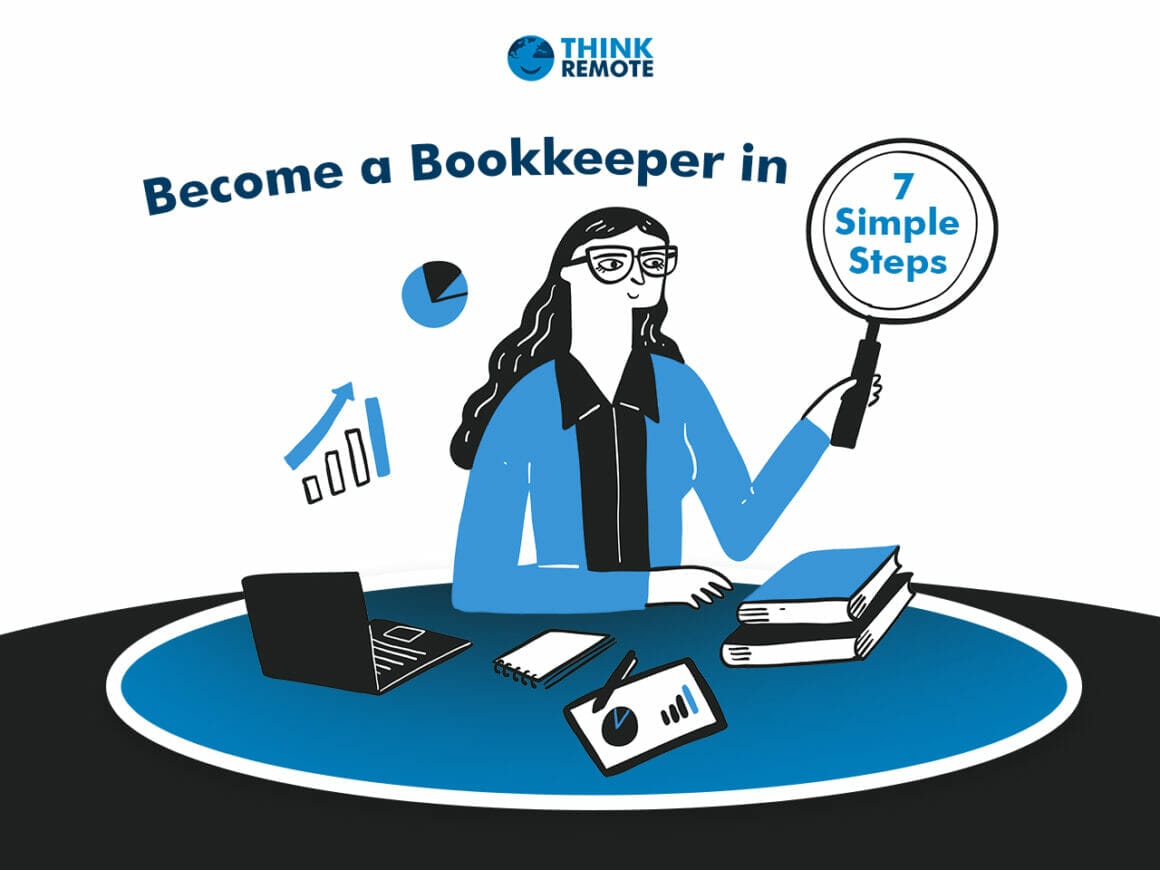Bookkeeping is one of the most popular remote jobs today. And with good reason, it is not capital intensive, and you don’t need special skills or experience to start. It is also one of the highest-paying remote jobs.
Want to learn how to become a bookkeeper? Read on to learn the basics about this career and how to find a remote bookkeeping job online.
First, let’s clear the air about some common misconceptions about bookkeeping.
Bookkeeping vs. Accounting
People use bookkeeping and accounting interchangeably, but they are not the same.
Bookkeeping is recording financial data in a ledger or database. In contrast, accounting interprets and presents that data to provide valuable information for business decisions.
Many think that these two activities overlap considerably, but most of the work involved in bookkeeping requires no accounting knowledge. Of course, a bookkeeper for a small business may do some simple accounting functions like balancing the checkbook and preparing monthly financial statements for the owners to review. But there’s still more to accounting than crunching numbers.
Plus, while you don’t need any certification to become a bookkeeper, you need a bachelor’s degree in accounting and 150 hours of college education to sit for the CPA exam.
What Does a Bookkeeper Really Do?
A bookkeeper is in charge of the financial affairs of their clients. They monitor, record, and process all incoming and outgoing payments for a specific account. The primary objective of bookkeepers is to maintain their clients’ economic stability and health.
Furthermore, they ensure compliance with federal laws and regulations for every financial transaction they conduct for their clients.
One of the perks of becoming a virtual bookkeeper is that you can choose to work full-time or part-time. This flexibility allows you to set your schedule; you can work from the comfort of your home or anywhere you like as long as you meet your client’s deadlines.
Other responsibilities of a virtual bookkeeper include:
- Creating and filing financial reports
- Keeping financial records up-to-date and reviewing them
- Writing and editing budgets
- Payroll management
- Keeping track of payables and receivables
- Informing clients about any financial irregularities
What Skills Do I Need to Become a Bookkeeper?
According to the Bureau of Labor Statistics (BLS), entry-level bookkeepers don’t need a degree. To succeed in the workplace, candidates develop existing skills in conjunction with on-the-job training.
You don’t need a formal education to become a bookkeeper, although some bookkeeping knowledge will help you in your day-to-day work. However, like most remote jobs, a good work ethic and self-discipline are essential. You also need to have:
- Attention to detail
- Organization
- Critical thinking
- Excellent communication
- Invoicing
- Basic math skill
- Account payable
- Data entry
- Time management
- Ledger
- Commitment
- A good memory and transparency
How Much Can I Make From Bookkeeping from Home?
How much you earn when you become a bookkeeper will depend on factors like your experience, job type, geographical location, industry, and others.
Below is a table that illustrates your earning potential:Level of Experience Potential Earnings Entry level $20 – $50 per hour Experienced $80+ per hour Salary earner $35 – $45k yearly
However, you can earn between $20 to $50 per hour for basic bookkeeping tasks. Experienced bookkeepers can charge up to $80 per hour or more.
Salaried bookkeepers can make between $35-$45k annually. But a freelancer with multiple clients working full-time can make even more.
Ideally, when starting out, you’ll want to offer your services at a lower rate to build your portfolio and show people what you can do. And as you gain more experience and earn a good reputation, you can increase your rates over time.
How to Become a Bookkeeper with No Experience
1. Acquire Knowledge
Though you don’t need a certification to become a bookkeeper, you still need to know the fundamentals. For instance, invoicing, account payable, ledger, and data entry are some essential skills you need to know for this job.
Even if you don’t plan to become a certified bookkeeper, you can take a bookkeeping course to learn the basics to build a solid foundation as a virtual professional. You can find many bookkeeping courses online to understand how to work from home as a freelance bookkeeper.
Some of the best online bookkeeping courses include
- Illumeo Online Bookkeeping Certificate Class
- Ed2Go Course Review
- Penn Foster Course Review
- QuickBooks Bookkeeping
2. Choose Your Clients
Virtual bookkeepers have the advantage of choosing who they work with – especially if they are freelancers. Think about what you want in your clients and which industries you want to work in – maybe your strength is working with nonprofit organizations or eCommerce.
Focus on a niche and work with businesses that connect with you. That way, you can offer better service to them and create long-term business relationships with them.
Also, don’t be too eager to work with everyone. If a client doesn’t suit you or isn’t a good fit – feel free to say no.
3. Familiarize Yourself with Relevant Tools
Bookkeeping tools differ depending on the industry you work. For instance, if you work with an e-commerce store, you’ll need cloud-based software like Quickbooks to track sales and refunds.
Similarly, if you’re working with a nonprofit organization, you’ll need a system like DonorPerfect to help you manage your donors, donations, and expenses.
4. Create a Website
Any online business requires some branding and promotion to gain traction and attract more clients. Becoming a virtual bookkeeper is no different.
Start by creating a personal website to showcase your profile and portfolio. It doesn’t have to be too elaborate or expensive. To get started, you can sign up for a free account on WordPress, Wix, or Weebly.
5. Set Your Rates
Setting your rate is one of the most critical aspects of your bookkeeping business. If you start too low, it may put you at a disadvantage. Should you charge a high fee and risk missing out on opportunities?
A general rule here is to research industry rates and average fees in your area for services similar to yours. That way, you can set your rates according to your experience and marketability.
If you feel undervalued, you can also talk to the client and explain your price point. As overwhelming as it may seem, it is part of the job and a learning curve for bookkeeping from home.
6. Find Your Clients
At this stage of your journey to become a bookkeeper, you need to find clients for your business to succeed. There are different approaches you can take here.
- Cold pitching: Start by sending a cold pitch email to companies or businesses you want to work with. However, this requires a little finesse and may take practice to say the right things. The reward is worth it, though.
- Freelance marketplaces: Another great way to find new clients for bookkeeping is by signing up as a freelance bookkeeper on popular freelance marketplaces like Upwork and Fiverr.
- Build a network: One of the best ways to grow your business is to build a personal network of potential clients and partners. Attend virtual networking events, join groups, and connect with people online to build your professional network.
7. Keep Learning and Scale
You have successfully landed a couple of clients and did a great job. It is time to scale up your business. To keep growing your business, you must constantly learn new techniques and stay up-to-date on best practices.
For instance, you might take an online bookkeeping course to learn something new or update your skills.
You can also participate in webinars or subscribe to relevant newsletters to stay current in your industry. And more importantly, continue building trust with clients and gain repeat work.
Your Move
Now, you know what it takes to become a bookkeeper. It’s time to start building your virtual business from the ground up. All it takes is patience, self-discipline, and a good work ethic to succeed as a bookkeeper from home!






